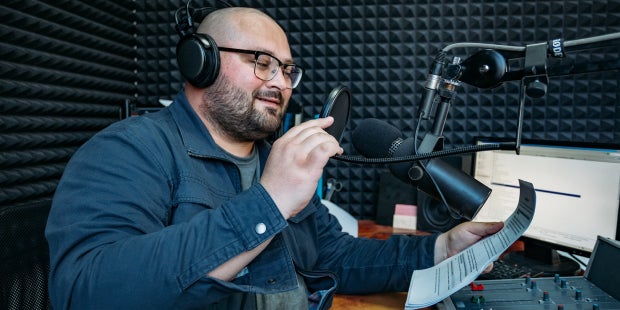Ever wondered how Penguin Random House Audio finds the voices who read their stories? The casting department works with PRH Audio’s producers to scout and develop narrator talent. What does their casting outreach look like? What stands out when they seek out new talent? What are some of the most unexpected challenges along the way? Discover all of this and more in the Q&A below with the PRH Audio casting department.
Meet the Team

The Penguin Random Audio Casting Department team: Julie Wilson (l); Lucas Behrends (m); Ashley Kooblall (r).
Julie Wilson, Director of Casting, Digital Production Platforms, & Strategic Partnerships, Senior Executive Producer
Lucas Behrends, Associate, Casting
Ashley Kooblall, Associate, Casting
What is the PRH Audio casting department and how do you support the producers?
The casting department assists PRH Audio’s producers by creating a more streamlined process to discover new voices and host auditions. We focus on increasing and diversifying the talent pool for the wide array of nearly 2,000 audiobooks that we publish every year.
How does the team settle on the best voice actor for any given role?
When a producer approaches us for casting assistance, they provide a detailed breakdown of the types of voices they hope to find for a specific project, which they create after reading the material and discussing voice requirements with the author. To find appropriate candidates, we utilize research tools like Ahab Talent—a global online casting platform that helps content creators find and hire the right actor for any voiceover project—internal databases, past conversations with narrators, and previous auditions. Additionally, we often reach out to our global network of entertainment agents for suggestions.
While we work on a variety of distinct titles, some of them in particular allow us to pinpoint gaps in our talent pool. One such project that was brought to our attention was Dear Wendy, a YA title that needed a youthful-sounding, queer asexual/aromantic narrator of Chinese descent. One of the main challenges was that asexuality, while increasingly recognized and understood, is still not very visible within the broader acting community. As a result, there were fewer individuals available for casting, especially when combined with the ethnic factor; this limited our options compared to more widely represented identities. Despite this difficulty, we remained committed to authentic representation and continued our search with the help of specialized casting networks and advocacy groups. In retrospect, it was a gratifying encounter because the narrator we cast was so excited to voice a character they could relate to!
What is the most joyous, unexpected aspect of casting audiobooks?
Working in audiobook casting is such a rewarding experience, not only because we work with such a dedicated internal team but because we get to engage with a supportive community of professional voiceover artists, narrators, and agents. It is a joy to connect narrators with projects that they are excited about and to help bring their voices to listeners across the world.
We also delight in the opportunity to foster new talent and take every chance to share information and guidance with those interested in stepping into the field. It is so fulfilling to watch someone evolve from just starting to learn about the industry to becoming a successful, talented narrator.
What are the first steps to getting cast by PRH Audio?
We are often approached by individuals who don’t have a great deal of experience in the audiobook industry, but who have a passion for the spoken word and feel drawn to pursue a career as a narrator. We point them to a number of resources , including Ahab Talent’s Instagram and YouTube accounts, which provide a plethora of information about how to improve performance and create demos, the recording process, and narrators’ insights about what it’s like behind the mic.
Additionally, we direct them to events hosted by Ahab Talent on Clubhouse, encourage them to attend workshops led by industry professionals, and refer them to SAG-AFTRA’s audiobooks page. We also inform them about the opportunity to join the Audio Publishers Association (APA), which organizes educational and networking events for narrators. Our goal is to equip them with a strong start and an understanding of the commitment required to become a successful narrator.
Once narrators have this information, we invite them to join Ahab Talent, if they haven’t already done so. Ahab is an instrumental source that we use to research, audition, and hire narrators, house narration samples, and highlight skills. Narrators can heighten their chances of gaining visibility to our team, receive invitations to auditions, and submit their work for open call projects. Ahab’s user base includes casting directors from outside PRH Audio, who may cast for audiobooks or many other areas of voiceover (animation, video games, podcasts, e-learning, etc.).
What does your casting outreach look like? And how has it evolved as the audio landscape expands?
It is never a dull moment in the casting department. Each day is a chance to dive into something new. We have a list of ongoing projects submitted to us by the producing team. When a new request comes through, we spend some time reviewing the criteria of the title, discuss what we’re looking for in a candidate, and then map out how to begin our search. Sometimes that translates into doing specific research or conducting outreach with agencies to collect a group of auditions, which we listen to multiple times before selecting our top picks to present to the producer. By doing so, we’re frequently able to highlight new and exciting talent—some of whom we meet by participating in events hosted by the APA for emerging talent, finding them on social media, or scheduling virtual one-on-one meet-and-greets with established screen and theater actors to assess their interest in audiobooks, as well as networking with agents to discuss future collaboration.
One title that came up in our queue was Nadia, a novel that shifts between the competing perspectives of two survivors of the 1990s Balkan Wars who escaped to London, only to discover that the war had followed them there. We knew we needed to find a feminine Bosnian voice—preferably of Muslim heritage—who had the vocal facility to perform in Russian, Yugoslavian, and Bosnian accents. However, we also knew that there were few Bosnian Muslim actresses within mainstream casting networks. This was an opportunity to turn to social media as our source. There, we found Selma Dučanović, a Bosnian Muslim actress whose parents had fled the war to western Europe, where she was born. Not only did she meet all the requirements for the project and provide an insightful audition, but we were thrilled that she brought such a deep care and understanding to the project.
Another standout name that comes to mind is Kiebpoli Calnek. We first heard Kiebpoli while doing research for a YA title that required a Black trans narrator with a youthful voice. Kiebpoli is a gender-expansive queer Black creative, born and raised in Lenapehoking/New York City. They are drawn to narratives that reflect the cultural fluidity of Blackness, queerness, and the mental-health industrial complex through relationships interwoven with spirituality, sociohistorical issues, and current events. This was the first audiobook Kiebpoli had auditioned for, and they ended up booking the role! Since then, they have successfully auditioned for and booked a second title, and we continue to keep them in mind for future projects.
What are some of the challenges you’ve faced in casting audiobooks?
We’re in the business of casting as authentically as possible and while that can mean we run into roadblocks in our searches, it also means that moving forward, there’s a lot of opportunity for the text and its authors to be honored truthfully. Another fun challenge is weeding through hundreds of auditions and narrowing down the best candidates to present to the producer. We like to call it a very friendly courtroom—listening to auditions and weighing in on the strengths/weaknesses of each voice before presenting a final list to the producer.
What is most likely to stand out to you when seeking out new talent?
We love meeting new talent and especially enjoy getting to know them on a personal level. Remembering important details about them helps us to pair them up with books they’d be passionate about. I have always been inquisitive and follow up to find out their why. Everyone has a cause or belief that inspires them to do what they do, and I feel when you think and communicate starting with why, you can inspire others and that comes full circle to explain why we do the work we do. Overall, I’m making note of not only how passionate you are, but what ignites that fire.
Tell us about a recent production/cast you’re particularly proud of.
Ashley: I love searching for a voice I hear in my head, and that’s exactly why Bumps in the Night is one of the most memorable productions I’ve cast. It’s a fun middle-grade read about a young American girl who stays with her grandmother in Trinidad for the summer and discovers that she comes from a long line of powerful witches. I knew that the narrator we hired had to not only sound age-appropriate but also hit the notes of the singsong Trini accent just right for the dialogue with her grandmother. This not only led us to discovering new agencies and developing new contacts but also opened doors to new and diverse vocal ranges.
Lucas: We recently had the pleasure of working on a title called Breathe: Journeys to Healthy Binding by Maia Kobabe and Sarah Peitzmeier, PhD. The title combines a study done with gender-expansive individuals who use chest binding in their daily lives and evidence-based resources on binding to create an extremely accessible and inclusive graphic guide. It was such a great experience to be part of a project that highlights the journeys of gender-expansive individuals and to connect narrators who could relate to the project through lived experiences.


